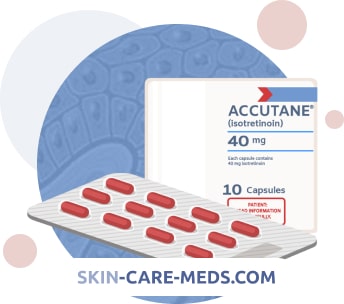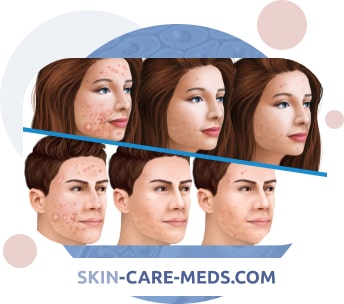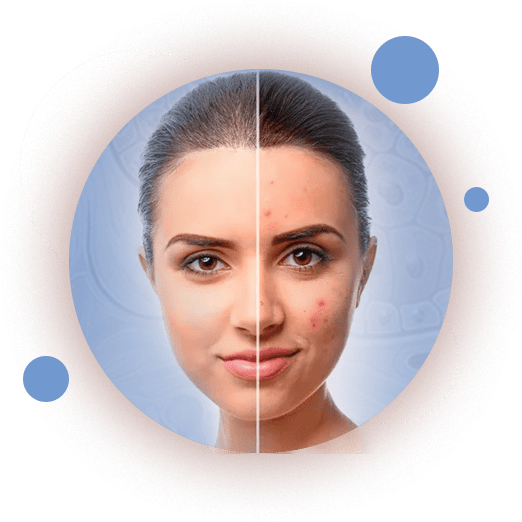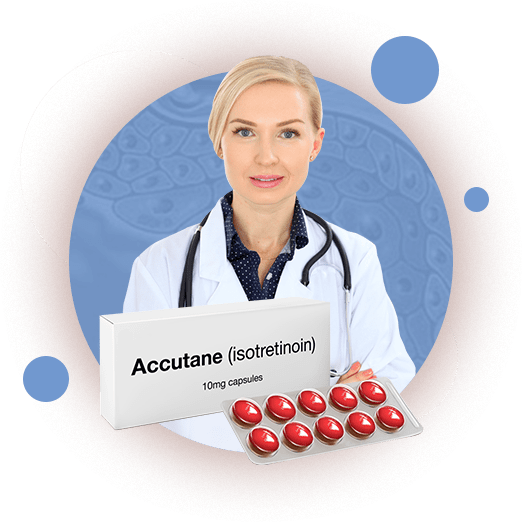
Isotretinoin, also known as 13-cis-retinoic acid and sold under the brand name Accutane among others, is a medication primarily used to treat severe acne. It is also used to prevent certain skin cancers (squamous-cell carcinoma), and in the treatment of other cancers. It is used to treat harlequin-type ichthyosis, a usually lethal skin disease, and lamellar ichthyosis. It is a retinoid, meaning it is related to vitamin A, and is found in small quantities naturally in the body. Its isomer, tretinoin, is also an acne drug.
The most common adverse effects are dry lips (cheilitis), dry and fragile skin, and an increased susceptibility to sunburn. Uncommon and rare side effects include muscle aches and pains (myalgias), and headaches. Isotretinoin is known to cause birth defects due to in-utero exposure because of the molecule's close resemblance to retinoic acid, a natural vitamin A derivative that controls normal embryonic development. It is also associated with psychiatric side effects, most commonly depression but also, more rarely, psychosis and unusual behaviours. Other rare side effects include hyperostosis, and premature epiphyseal closure, have been reported to be persistent.
Women taking isotretinoin must not get pregnant during and for one month after the discontinuation of isotretinoin therapy. Sexual abstinence or effective contraception is mandatory during this period. Barrier methods by themselves (e.g., condoms) are not considered adequate due to the unacceptable failure rates of approximately 3%. Women who become pregnant while taking isotretinoin therapy are generally counseled to have an abortion.

Medical uses
Isotretinoin is used primarily for severe cystic acne and acne that has not responded to other treatments. Many dermatologists also support its use for treatment of lesser degrees of acne that prove resistant to other treatments, or that produce physical or psychological scarring. Isotretinoin is not indicated for treatment of prepubertal acne and is not recommended in children less than 12 years of age.
It is also somewhat effective for hidradenitis suppurativa and some cases of severe rosacea. It can also be used to help treat harlequin ichthyosis, lamellar ichthyosis and is used in xeroderma pigmentosum cases to relieve keratoses. Isotretinoin has been used to treat the extremely rare condition fibrodysplasia ossificans progressiva. It is also used for the treatment of neuroblastoma, a form of nerve cancer.
Prescribing restrictions
Isotretinoin is a teratogen; there is about a 20–35% risk for congenital defects in infants exposed to the drug in utero, and about 30–60% of children exposed to isotretinoin prenatally have been reported to show neurocognitive impairment. Because of this, there are strict controls on prescribing isotretinoin to women who may become pregnant and women who become pregnant while taking isotretinoin are strongly advised to terminate their pregnancies.
In most countries, isotretinoin can only be prescribed by dermatologists or specialist physicians; some countries also allow limited prescription by general practitioners and family doctors. In the United Kingdom and Australia, isotretinoin may be prescribed only by or under the supervision of a consultant dermatologist. Because severe cystic acne has the potential to cause permanent scarring over a short period, restrictions on its more immediate availability have proved contentious. In New Zealand, isotretinoin can be prescribed by any doctor but subsidised only when prescribed by a vocationally-registered general practitioner, dermatologist or nurse practitioner.
Possible permanent effects
Isotretinoin may stop long bone growth in young people who are still growing. Premature epiphyseal closure can occur in people with acne receiving recommended doses of Accutane.
Generally, though, premature epiphyseal closure seems to be primarily related to:
- high doses of isotretinoin beyond the recommended dose of 1mg/kg/day;
- long-duration beyond the usual course of what is required for an acne patient for treatment (usually 5–7 months);
- early onset of treatment (young teenage age 12–14 or younger).
Isotretinoin is known to cause meibomian gland dysfunction which causes persistent keratoconjunctivitis sicca (dry eye). Problems with the meibomian and salivary glands are likely due to the non-selective apoptosis of the cells of the exocrine glands. Decreased night vision has been reported to persist in some people after discontinuation of isotretinoin therapy.
Sexual
Isotretinoin is also associated with sexual side effects, namely erectile dysfunction and reduced libido. In October 2017, the UK MHRA issued a Drug Safety Update to physicians in response to reports of these problems. This was in response to an EU review, published in August 2017, which states that a plausible physiological explanation of these side effects "may be a reduction in plasma testosterone". The review also stated that "the product information should be updated to include ‘sexual dysfunction including erectile dysfunction and decreased libido’ as an undesirable effect with an unknown frequency". There have also been reports of spermatogenesis disorders, such as oligospermia. 27 cases of sexual dysfunction report either negative dechallenge or positive dechallenge.
Skin
The most common side effects are mucocutaneous: dry lips, skin and nose. Other common mucocutaneous side effects are inflammation and chapping of the lips (cheilitis), redness of the skin (erythema), rashes, peeling, eczema (dermatitis), itching (pruritus) and nose bleeds (epistaxis). Absence of dryness of the lips is considered an indication of non-compliance with treatment (not taking the drug as advised), as it occurs in almost all people who take it.
Regular use of lip balm and moisturizer is recommended throughout a course of treatment to reduce these problems. The dose may need to be decreased to reduce the severity of these side effects. The skin becomes more fragile—especially to frictional forces—and may not heal as quickly as normal. Wound healing is delayed. For this reason, elective surgery, waxing of hair, tattooing, tattoo removal, piercings, dermabrasion, exfoliation, etc., are not recommended. Treatment of acne scars is generally deferred until 12 months after completion of a course of isotretinoin.
Acne usually flares up 2–3 weeks into the treatment and is usually mild and tolerable. Occasionally this flare-up is severe, necessitating oral antibiotics such as doxycycline. A short course of oral prednisolone may be required. Some dermatologists favour a few weeks of pre-treatment with oral antibiotics before commencing isotretinoin to reduce the chance of a severe flare. A "stepped" course may also be used to reduce the chance of this initial flare, by which the initial dose is low (e.g. 0.5 mg/kg) and subsequently increased throughout the course.
Isotretinoin use can rarely lead to a more severe form of acne, acne fulminans.
Teratogenicity
Isotretinoin is a teratogen highly likely to cause birth defects if taken by women during pregnancy or even a short time before conception. A few of the more common birth defects this drug can cause are hearing and visual impairment, missing or malformed earlobes, facial dysmorphism, and abnormalities in brain function. In the EU, isotretinoin (oral) is contraindicated in pregnancy and must not be taken by women able to have children unless the conditions of a pregnancy prevention programme are met.
The manufacturer recommends pregnancy be ruled out two weeks prior to commencement of isotretinoin, and women should use two simultaneous forms of effective contraception at least one month prior to commencement, during, and for at least one month following isotretinoin therapy.
In the U.S., around 2000 women became pregnant while taking the drug between 1982 and 2000, with most pregnancies ending in abortion or miscarriage. About 160 babies with birth defects were born. After the FDA put the more strict iPLEDGE program in place for the companies marketing the drug in the US, in 2011, 155 pregnancies occurred among 129,544 women of childbearing potential taking isotretinoin (0.12%).
People taking isotretinoin are not permitted to donate blood during and for at least one month after discontinuation of therapy due to its teratogenicity.
Psychological effects
Rare psychological side effects may include depression, worsening of pre-existing depression, aggressive tendencies, irritable mood and anxiety. Very rare effects include abnormal behaviour, psychosis, suicidal ideation, suicide attempts and suicide. In a total of 5577 adverse reactions reported to the UK's MHRA up to 31 March 2017, the plurality (1207, or 22%) concerned psychiatric effects. There were 85 reports of suicidal ideation, 56 of completed suicide and 43 of suicide attempts.
The association between isotretinoin use and psychopathology has been controversial. Beginning in 1983, isolated case reports emerged suggesting mood change, particularly depression, occurring during or soon after isotretinoin use. A number of studies have been conducted since then of the drug's effect on depression, psychosis, suicidal thoughts and other psychological effects.
Depression and suicidality
Isotretinoin is the only non-psychiatric drug on the FDA's top 10 list of drugs associated with depression and is also within the top 10 for suicide attempts. A black box warning for suicide, depression and psychosis has been present on isotretinoin's packaging in the United States since 2005. In March 2018, European Medicines Agency issued a warning on a possible risk of neuropsychiatric disorders (such as depression, anxiety and mood changes) following the use of oral retinoids, including isotretinoin.
In 2012, a systematic review covering all articles in the literature related to isotretinoin, depression and suicide, as well as articles related to class effect, dose response, and biologic plausibility found that the literature reviewed was consistent with an association of isotretinoin administration and depression and with suicide in a subgroup of vulnerable individuals. Following this systematic review, in a 2014 review a group of Australian dermatologists and psychiatrists collaborated on a set of recommendations for safe prescribing of isotretinoin. However, whether isotretinoin use is causally associated with mental illness remains controversial.
Evidence for depression being causally associated with isotretinoin use includes 41 reports of positive challenge/dechallenge/rechallenge with isotretinoin, involving administering isotretinoin, withdrawing the drug, and then re-administering it. The majority of these cases had no psychiatric history. There is also a temporal relationship between the development of depression and initiation of isotretinoin treatment, with most cases developing after 1–2 months of treatment. Further, higher doses of isotretinoin increase the risk of developing depression, with 25% of people showing depression on a dose of 3 mg/kg/day as compared with 3–4% at normal doses. Studies have uncovered several biological processes which may credibly explain the affective changes induced by isotretinoin.
Psychosis
Isotretinoin has also been linked to psychosis. Many of the side effects of isotretinoin mimic hypervitaminosis A, which has been associated with psychotic symptoms. The dopamine hypothesis of schizophrenia and psychosis suggests that an increase in dopaminergic stimulation or sensitivity in the limbic system causes psychotic symptoms.
It has been suggested that dysregulation of retinoid receptors by retinoids such as isotretinoin may cause schizophrenia. The evidence for this is threefold: transcriptional activation of the dopamine D2 receptor – in addition to serotonin and glutamate receptors – is regulated by retinoic acid; schizophrenia and the retinoid cascade have been linked to the same gene loci; and retinoid dysfunction causes congenital anomalies identical to those observed in people with schizophrenia. Further, the expression of dopamine receptors has indeed been shown to be regulated by retinoic acid.
Musculoskeletal
Isotretinoin has a number of muscoloskeletal effects. Myalgia (muscular pain) and arthralgia (joint pain) are rare side effects. Retinoids, such as high dose etretinate, are well known to cause bone changes, the most common type of which is hyperostotic changes (excessive bone growth), especially in growing children and adolescents. Other problems include premature epiphyseal closure and calcification of tendons and ligaments. The bones of the spine and feet are most commonly affected. Risk factors for skeletal effects include older age, greater dosage and longer course of treatment. Most bone changes cause no symptoms and may only be noticed using X-ray imaging.
Gastrointestinal
Isotretinoin may cause non-specific gastrointestinal symptoms including nausea, diarrhea and abdominal pain. The drug is associated with inflammatory bowel disease (IBD)—ulcerative colitis, but not Crohn's disease. There are also reports of people developing irritable bowel syndrome (IBS) and worsening of existing IBS.
Eyes
Isotretinoin and other retinoids are well known to affect the eyes. Dry eyes are very common during treatment and is caused by isotretinoin's apoptotic effect on the meibomian glands. Some people develop contact lens intolerance as a result. In some people, these changes are long-lasting or irreversible and represent Meibomian Gland Dysfunction (MGD). Other common effects on the eyes include inflammation of the eyelid (blepharitis), red eye caused by conjunctivitis and irritation of the eye. More rare ocular side effects include blurred vision, decreased night vision (which may be permanent), colour blindness, development of corneal opacities, inflammation of the cornea (keratitis), swelling of the optic disk (papilloedema, associated with IIH), photophobia and other visual disturbances.
Pharmacology. Mechanism of action
Isotretinoin's exact mechanism of action is unknown, but several studies have shown that isotretinoin induces apoptosis (programmatic cell death) in various cells in the body. Cell death may be instigated in the meibomian glands, hypothalamic cells, hippocampus cells and—important for treatment of acne—in sebaceous gland cells. Isotretinoin has a low affinity for retinoic acid receptors (RAR) and retinoid X receptors (RXR), but may be converted intracellularly to metabolites that act as agonists of RAR and RXR nuclear receptors.
One study suggests the drug amplifies production of neutrophil gelatinase-associated lipocalin (NGAL) in the skin, which has been shown to reduce sebum production by inducing apoptosis in sebaceous gland cells, while exhibiting an antimicrobial effect on Cutibacterium acnes. The drug decreases the size and sebum output of the sebaceous glands. Isotretinoin is the only available acne drug that affects all four major pathogenic processes in acne, which distinguishes it from alternative treatments (such as antibiotics) and accounts for its efficacy in severe, nodulocystic cases. The effect of Isotretinoin on sebum production can be temporary, or remission of the disease can be "complete and prolonged."
CNS activities
A possible biological basis for the case reports of depression involves decreased metabolism in the orbitofrontal cortex (OFC) of the frontal lobe. It has also been found that decreased OFC metabolism was correlated with headaches. People reporting headache as a side effect often report comorbid neuropsychiatric symptoms, especially depression; a statistically significant relationship between headache and depression has been established. It is suggested that people sensitive to isotretinoin-induced CNS effects may also be susceptible to other psychiatric side effects such as depression.
Studies in mice and rats have found that retinoids, including isotretinoin, bind to dopaminergic receptors in the central nervous system. Isotretinoin may affect dopaminergic neurotransmission by disrupting the structure of dopamine receptors and decreasing dopaminergic activity. The dopaminergic system is implicated in numerous psychological disorders, including depression. Isotretinoin is also thought to affect the serotonergic system – it increases expression of 5-HT1A receptors in the pre-synaptic neuron, which inhibit serotonin secretion. Isotretinoin also directly and indirectly increases the translation of the serotonin transporter protein (SERT), leading to increased reuptake and consequently reduced synaptic availability of serotonin.
Inhibition of hippocampal neurogenesis may also play a role in the development of isotretinoin-induced depression. A further effect of isotretinoin on the brain involves retinoic acid function in the hypothalamus, the hormone regulatory centre of the brain and part of the hypothalamus-pituitary-adrenal axis, a key part of the body's stress response. Other brain regions regulated by retinoic acid and potentially disrupted by isotretinoin include the frontal cortex and the striatum.

Pharmacokinetics and pharmacodynamics
Oral Isotretinoin is best absorbed when taken with a high-fat meal, because it has a high level of lipophilicity. The efficacy of isotretinoin doubles when taken after a high-fat meal compared to when taken without food. Due to Isotretinoin's molecular relationship to Vitamin A, it should not be taken with Vitamin A supplements due to the danger of toxicity through cumulative overdosing. Accutane also negatively interacts with tetracycline, another class of acne drug, and with micro-dosed ('mini-pill') progesterone preparations, norethisterone/ethinylestradiol, St. John's Wort, phenytoin, and systemic corticosteroids.
Isotretinoin is primarily (99.9%) bound to plasma proteins, mostly albumin. Three metabolites of Isotretinoin are detectable in human plasma after oral administration: 4-oxo-isotretinoin, retinoid acid (tretinoin), and 4-oxo-retinoic acid (4-oxo-tretinoin). Isotretinoin also oxidizes, irreversibly, to 4-oxo-isotretinoin—which forms its geometric isomer 4-oxo-tretinoin. After an orally-administered, 80 mg dose of liquid suspension 14C-isotretinoin, 14C-activity in blood declines with a half-life of 90 hours. The metabolites of isotretinoin and its conjugates are then excreted in the subject's urine and faeces in relatively equal amounts. After a single, 80 mg oral dose of Isotretinoin to 74 healthy adult subjects under fed conditions, the mean ±SD elimination half-life (t1/2) of isotretinoin and 4-oxo-isotretinoin were 21.0 ± 8.2 hours and 24.0 ± 5.3 hours, respectively. After both single and multiple doses, the observed accumulation ratios of isotretinoin ranged from 0.90 to 5.43 in people with cystic acne.
 DE
DE FR
FR IT
IT ES
ES








